Coronavirus Australia live news: Infected man breaches quarantine in South Australia
An infected man has breached quarantine at Flinders University in Adelaide, spurring urgent calls for residents to get tested.
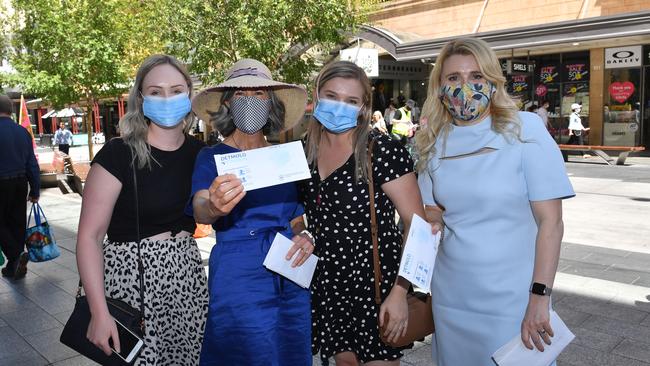
- Infected SA man breaches quarantine
- Cruise ship passengers need negative test
- UK to approve vaccine next week
- Protests erupt across Europe
Welcome to The Australian’s rolling coverage of the ongoing coronavirus pandemic.
An infected man has breached quarantine at Flinders University in Adelaide, spurring urgent calls for residents to get tested. The cruise ship industry is putting in place strict new measures in the hope it can open up again before Christmas. Britain is reportedly set to approve the COVID-19 vaccine developed by BioNTech SE and Pfizer next week. Protests erupted across European cities on Saturday, with thousands on the streets calling for restrictions to be eased.
Greg Brown 11.15pm: PM to support producers hit by trade sanctions
Scott Morrison has flagged government support for producers hit by China’s trade sanctions as Australia considers lodging a formal protest against the tariffs with the World Trade Organisation.
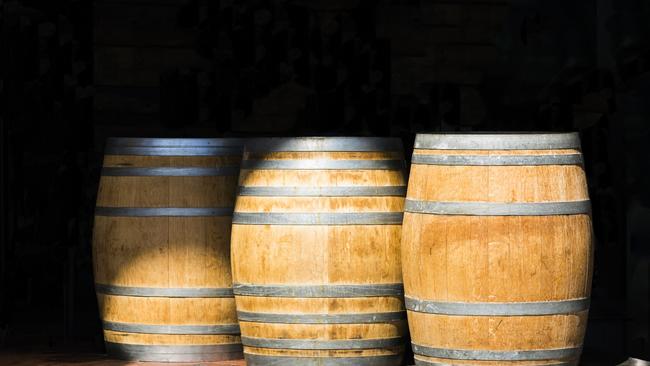
The Prime Minister conceded there were “tensions” in the relationship after China on Friday imposed duties of up to 212 per cent on wine exports, claiming Australia was dumping the product.
It followed China targeting Australian barley, lobster and coal exports in the past year, with tension between the countries increasing since Foreign Minister Marise Payne called for an independent probe into the source of the coronavirus.
“As a government we will be looking at how we can get a number of our producers through this difficult time,” Mr Morrison told ABC radio.
“We have done that through COVID as people would know. The airlines basically shut down and the planes weren’t there to (carry) things like crayfish and other things.
Read the full story here.
Patrick Commins 10.30pm: Figures reveal ‘promising signs’ of economic recovery
More than two million Australians stopped receiving JobKeeper payments in October amid a resurgent economy and tighter eligibility rules.
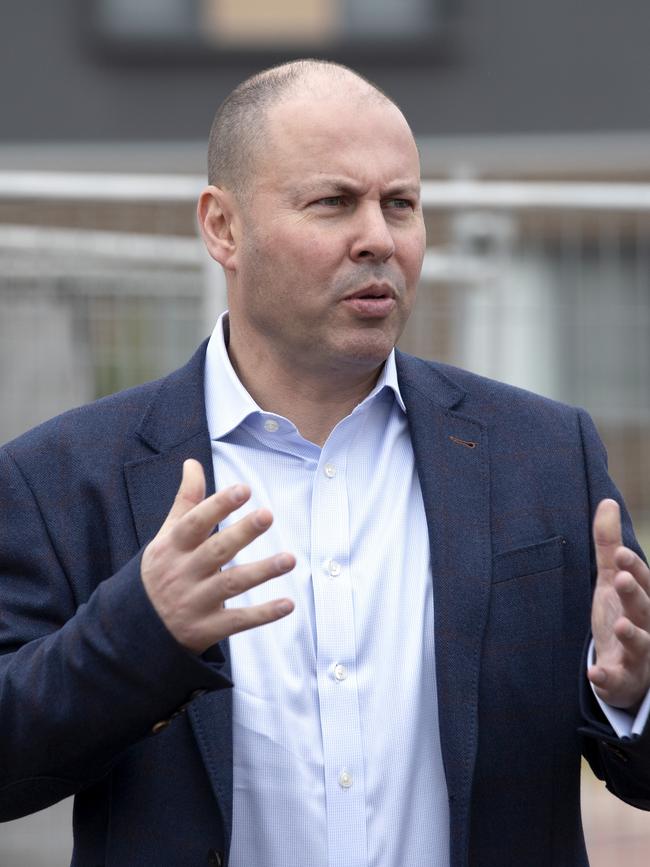
The second phase of the wage subsidy scheme reassessed firms’ profitability from September 27 and introduced a two-tiered payment for full-time and part-time workers, leading to a near halving in the number of businesses applying for the program.
Treasurer Josh Frydenberg said “the lower-than-forecast take-up of the JobKeeper payment extension in October is further evidence that Australia’s recovery from this once-in-a-century pandemic is well under way”.
Treasury figures revealed 450,000 fewer businesses and around two million fewer employees qualified for JobKeeper in October than in September, leaving 1.5 million workers still relying on it.
Read the full story here.
Adam Creighton 9.45pm: Victoria in ‘dire’ state, AAA rating at risk
Credit ratings agencies say Victoria’s public finances are “dire”, with one warning the country’s second-largest state could be stripped of its AAA rating within weeks — the first downgrade of an Australian government in seven years.
S&P Global Ratings, which said in August that Victoria had a 50 per cent chance of a downgrade, is now more concerned about the state’s finances and “likely the largest ever” deficit of any AAA-rated government in the world.
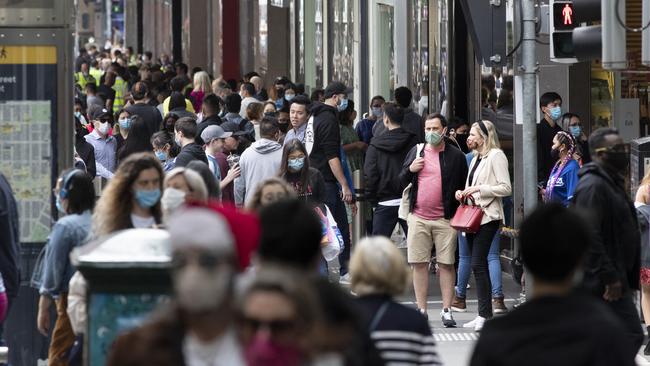
Any downgrade would leave NSW, the ACT and the commonwealth as the only AAA-rated governments in the country.
“Victoria is increasing borrowing substantially more than what we are seeing in NSW relative to its balance sheet,” Anthony Walker, S&P’s top sovereign analyst for Australia, said. “It’s been more aggressive in its borrowing and spending”.
The agency was in May expecting Victoria to post a deficit this financial year of about 20 per cent of revenue. “Early indications are Victoria’s 2021 deficit will be more than 50 per cent of its revenue, likely the largest ever deficit seen for a AAA-rated (state) government,” Mr Walker said. “What we have seen is pretty dire compared to our expectations.”
Read the full story here.
Jared Lynch 9pm: Aussie water system kills deadly bacteria
A Melbourne-based company has developed technology that can kill legionella bacteria in cooling systems in hospitals and shopping centres, as well as create drinkable water straight from the tap in developing countries and potentially wipe out COVID-19.
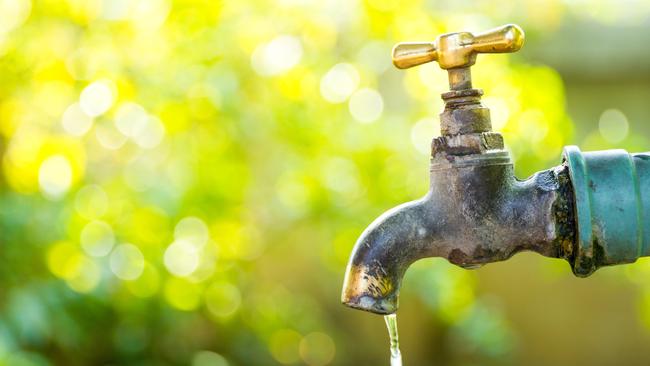
MicroHeat hopes to generate more than $20m in revenue in the next few years via licensing deals for its technology, which the National Association of Testing Authorities (NATA) has confirmed destroys major water bacteria including E. coli, salmonella and legionella.
Chief executive Brett Hernadi said the company’s water-heating system was different to conventional systems because it generated hydroxyl radicals (OH), a “powerful disinfectant”.
Read more: MicroHeat water system kills deadly bacteria
Sarah Elks 8.15pm: Hiking state debt the ‘only thing we can do’: Dick
Queensland Treasurer Cameron Dick has warned hiking the state’s debt is the “only thing we can do” to help the economy recover from the COVID-19 pandemic but insists the borrowings will be far less than in NSW and Victoria.
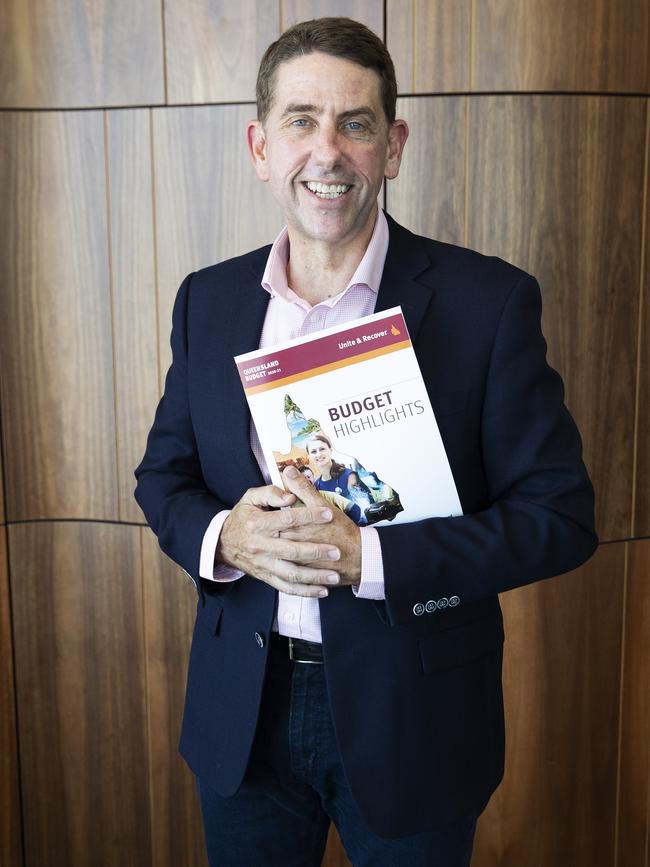
Ahead of Tuesday’s delayed state budget, Mr Dick said the government did not want to borrow any more but had to, otherwise he would “drop an anvil of austerity” on Queenslanders struggling financially.
While Mr Dick would not say how much debt would rise, he said borrowings would be “significant” but “reasonable and prudent”. In September, Treasury forecast Queensland’s total debt would rise to $102bn by mid-next year, but that does not include the $4bn over four years Mr Dick has promised to borrow to fund promises made at the recent state election.
On top of the $4bn, Mr Dick will be forced to increase debt to fund deficits for at least the next four years.
Read the full story here.
Patrick Commins 7.30pm: Covid blasts a $25bn GST hole over three years
The COVID-19 recession will blow a $25bn hole in state and territory finances over coming years, further complicating the task of fiscal repair following big spending budgets announced over recent weeks.
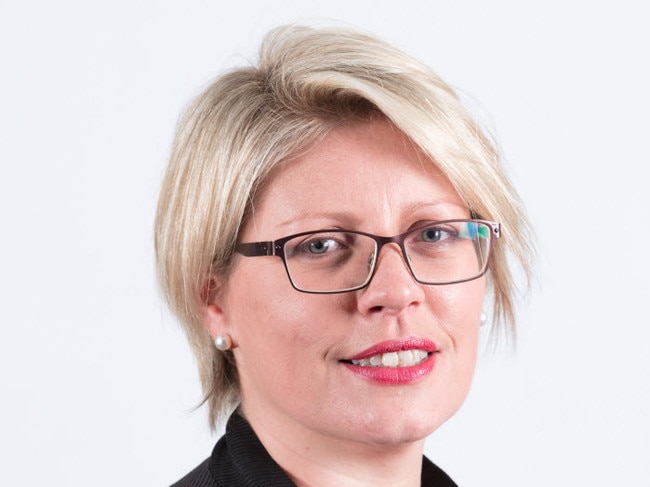
All states aside from the ACT and Queensland — which will produce its budget on Tuesday — have now handed down much delayed 2020-21 budgets. Exclusive analysis of the documents by ANZ reveals that the virus and measures taken to control its spread means states and territories will slash a combined $23.3bn from GST revenues over the three years to 2022-23 versus what had been expected before the pandemic hit.
The health crisis has “basically blown a big hole in state finances”, ANZ economist and budget specialist Cherelle Murphy said.
NSW is the only state to release figures which compare pre- and post-COVID estimates for GST revenue out to 2023-24. If included, that would add a further $2.3bn to the GST deficit, lifting the total to $25.6bn, the ANZ analysis showed, suggesting the hit to state revenues would extend further into the decade.
The analysis showed state and territory treasury officials were more pessimistic than their federal counterparts, even before including the yet to be released Queensland budget. The October 6 commonwealth budget estimated the GST pool would shrink by $19.5bn over the four years to 2023-24.
Read the full story here.
Paul Garvey 5.45pm: Elderly man heckles Premier over border
WA premier Mark McGowan has faced down heckling from by an elderly man as he continued to defend his delay in reopening the state to arrivals from Victoria.
Mr McGowan was challenged over his reluctance in dropping the two-week quarantine requirement for passengers arriving from Victoria — which officially eliminated the coronavirus last week — by the man during a press conference at a hospital south of Perth on Sunday.
West Australian chief health officer Andy Robertson had already advised that it would be safe to drop quarantine restrictions for arrivals from states without 28 days of community transmission, but Mr McGowan maintains that the government will continue to wait on the receipt of updated advice from Dr Robertson before any decision is made about the border.
“We’ve just been through the most stressful period in the state since the Second World War and caution has worked. Being careful, being risk averse has worked. I’m going to continue to be cautious and risk averse,” he said.
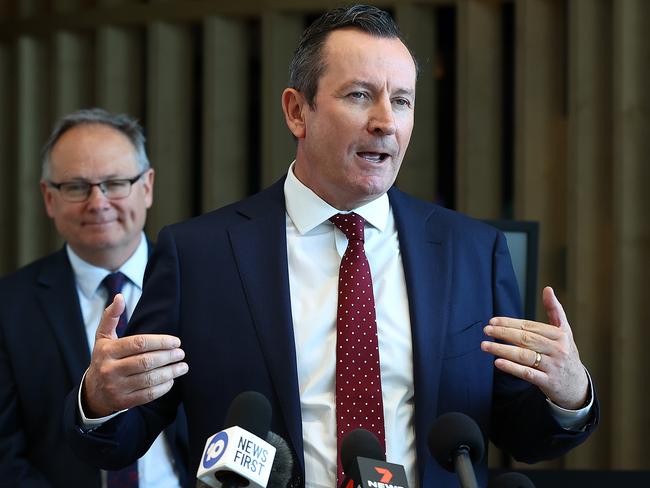
“If you act outside of health advice and you act too quickly, well then you run risks and we all know what risks can do. Victoria went through a shocking period, NSW went through a shocking period, South Australia went through a full lockdown not more than a week ago.
“People have pushed me to make decisions quickly during this period and if I had followed their advice, WA would have been in a terrible position. So we will just continue to be risk-averse.”
The public heckling of Mr McGowansat in contrast to the good-natured interruption he received at a press conference earlier this year, when his tough border stance had helped make him the most popular political figure in the country. In that instance, the scream of “you’re a f. king legend, McGowan, woo!” — which was duly translated by an Auslan interpreter — went viral.
With Christmas looming, and the virus back under control, there has been growing displeasure over the continued restrictions on arrivals from Australia’s two most populous states.
Visitors from Queensland, Tasmania, Northern Territory and the ACT have been able to enter WA without quarantining since mid-November. Restrictions were also eased with South Australia but have since been reintroduced since that state suffered another outbreak.
It is now looking increasingly likely that the reopening to Victoria will be delayed to coincide with NSW reaching the 28-day milestone later this week.
Asked if WA would drop the quarantine requirements for both states simultaneously, Mr McGowan said he would not pre-empt the decision but noted both states were “clearly very connected”.
“They have all these border crossings, the population density in NSW and Victoria is very different to here,” he said.
“The spread of the virus there was shocking. We avoided all of that.”
READ MORE: PM vows: We will support our exporters
AFP 5pm: Virus surge leads to curfew in San Francisco
A surge in coronavirus cases will put San Francisco under a curfew beginning on Monday and trigger other restrictions related to the virus, the city announced.
The curfew requires non-essential businesses to close and prohibits members of different households from gathering between 10pm and 5am until December 21, Mayor London Breed said on Sunday (AEDT).
San Mateo county outside San Francisco will also be subject to the same rules after the state of California classified both under its most restrictive tier of locations based on the spread of the virus.
In addition to the curfew, certain indoor businesses will be required to either close or reduce capacity beginning on Sunday at noon (Monday 9am, AEDT), Ms Breed said.
“I don’t know how to be more clear — this is the most dangerous time we’ve faced during this pandemic,” she said on Twitter.
“Do not travel or gather with others. We have to get this under control now and we can’t afford to let things continue at this rate.”
On Friday, a temporary ban on gatherings of people from different households, with religious services and protests exempt, was announced for California’s largest city, Los Angeles.
That order affecting the US’s second-largest city will take effect Monday and last at least three weeks, until December 20, Los Angeles county’s public health department said.
California imposed a night-time curfew across much of the state a week ago, but San Francisco was not affected because it was not at the time classified among the state’s most restrictive tier of locations.
The US topped 13 million COVID-19 cases — the world’s highest — over the weekend and president-elect Joe Biden has warned of difficult weeks ahead before vaccines become widely available.
READ MORE: Thousands at virus-wary concert
AFP 4pm: Germany turns to drive-in Christmas markets
Chestnuts roasting, mulled wine steaming and music blaring from wooden chalets lined with artificial snow — the Landshut Christmas market in southern Germany has all the usual trimmings.
But this year, visitors must enjoy the sights and smells of the traditional Christmas market from inside their cars due to precautions to prevent the spread of COVID-19.
Every night after dark, several dozen vehicles roll into the Christmas market drive-in, their occupants cosy and socially distanced inside.
Once through the gates, they must wait for an employee wearing a mask and a Christmas hat to knock on their window and offer them a menu of savoury treats to choose from, such as crepes, sausages and roasted chestnuts.
Orders placed, they can then drive on to the next hut offering sweets such as candy floss or gingerbread hearts.
“We take our inspiration from fast-food chains,” smiles Patrick Schmidt, 31, market organiser and owner of the Zollhaus Landshut restaurant.
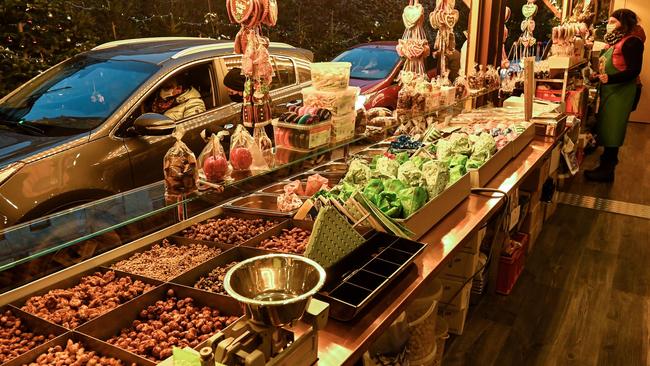
“We wanted to recreate a bit of the Christmas atmosphere, even if it’s more complicated this year.” The market is a way of helping his business get through “a difficult time”, he said.
As Germany battles a second wave of coronavirus infections, leisure and sporting facilities have been ordered to close while restaurants and bars can only offer takeaways.
The restrictions also include limits on social gatherings and have been a huge blow to Germany’s 3000 or so annual Christmas markets.
The markets have been an annual fixture in Germany since the 15th century, when craftsmen and bakers were given special permission to ply their wares in town squares in the run-up to Christmas.
But many German cities have cancelled their Christmas markets entirely this year, despite the huge financial losses — the markets draw about 160 million visitors annually and bring in revenues of €3bn ($4.8bn) to €5bn, according to the BSM stallkeepers’ industry association.
To keep the spirit — and the economic benefits — of Christmas alive, cities across the country have come up with creative initiatives.
In Berlin’s Charlottenburg-Wilmersdorf district, small clusters of huts have been spread across several streets, though food and drink cannot be consumed on site.
The world-famous Nuremberg Christmas market has been cancelled this year but managed to hold an online version of its traditional opening ceremony.
And in northwest Germany, the town of Kalkar is also offering a drive-in Christmas market.
The market in Landshut has been open since mid-November and is proving popular with locals, according to Schmidt. “Last Saturday we had 500 cars,” he said.
READ MORE: Home grants scheme is extended
Emily Ritchie 3.20pm: Bushfire damages home, alert downgraded
Fire crews are battling to save a home that erupted into flames after a previously out-of-control bushfire raged through Northmead in Sydney’s west.
Waterbombing aircraft have been drawing water from nearby Lake Parramatta to try and extinguish the blaze as gusty westerly winds sweep across the city in severe heatwave conditions.
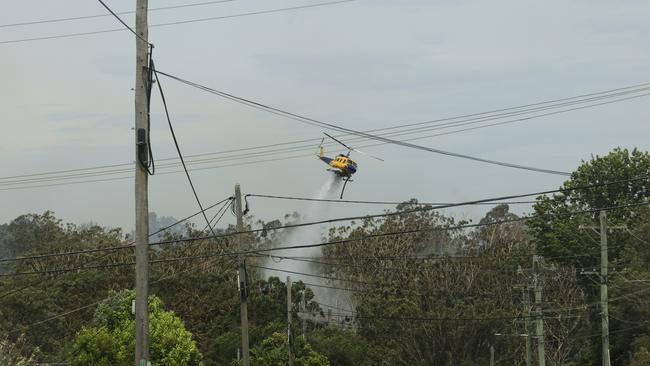
NSW Rural Fire Service spokesman Greg Allan said firefighters were desperately working to save the home on Whitehaven Road which was being consumed by flames.
The full extent of damage is not yet clear, he said.
READ MORE: Home alight amid heatwave
Emily Ritchie 2.10pm: Out of control fire in west Sydney
Residents in Northmead in Sydney’s west are being urged to take action and initiate their bushfire survival plans as an out-of-control blaze threatens homes in the area.
The NSW Rural Fire Service issued a Watch and Act alert warning on Sunday afternoon, saying the fire was burning near the Whitehaven Road area to the north of Parramatta.
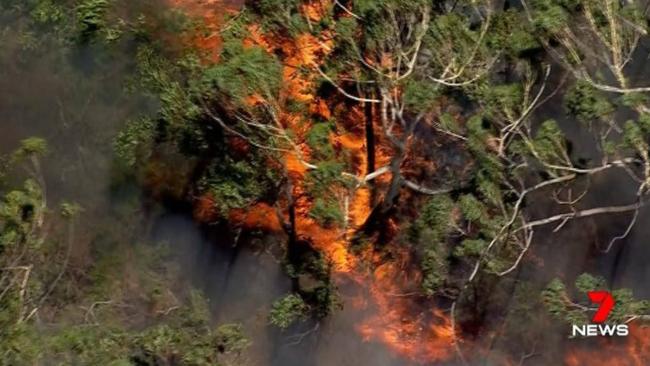
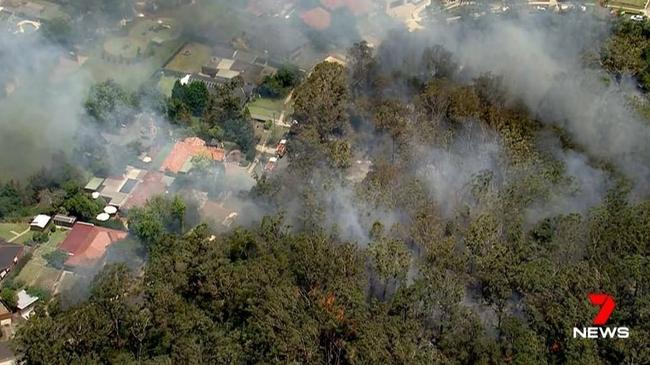
It said additional crews and aircraft were being sent to the scene to contain the blaze, which is being fanned in windy, severe heatwave conditions. As at 1.30pm on Sunday, Northmead’s temperature had soared to 41C.
“Take advice from firefighters who are working on the street and seek shelter as the fire approaches,” NSW RFS said in a statement.
“If you are in nearby streets, watch for embers which could start a fire ahead of the main fire.”
READ MORE: Home alight amid heatwave
James Hall 1.25pm: Infected man in SA breaches quarantine
An infected man has breached quarantine in Adelaide, leading to ever more urgent calls for residents to get tested.
The man in his 30s visited the Intensive English Language Institute at Flinders University Sturt Campus, with South Australia’s chief public health officer Nicola Spurrier saying it was “critical” people responded to the cluster update.
Professor Spurrier told reporters on Sunday afternoon the breach had created a “significant risk” to the state’s containment of the deadly virus and desperately wanted the new message spread far and wide.
Anyone who attended the campus and three retail venues across the city at a specific time period is being urged to seek a test and immediately quarantine.
These sites include:
– Flinders University Sturt Campus Nov 13 – Nov 28
– Big W Brickworks 22 Nov 12:15-12:50pm
– Foodland Norwood 22 Nov 1:20-2:00pm
– Kmart Kurralta Park 22 Nov 2:45-3:10pm
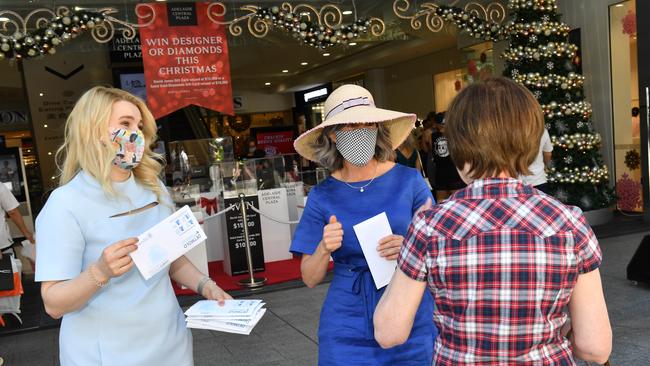
“When I spoke yesterday, my initial understanding was that the case was in quarantine and certainly they were considered a casual contact at the Intensive English Language Institute,” Prof Spurrier said on Sunday.
“Unfortunately, they did not spend the whole time in quarantine and at one point were out and about on a day and I need to let people know of some places of concern.
“We want you to get tested immediately even if you have no symptoms.”
South Australia recorded no new cases on Sunday after adding another two on Saturday.
“Those four locations, we are considering at high risk, and we want anyone who’s been there at those times and dates to get tested,” Prof Spurrier said.
“It has, quite frankly, posed a very significant risk for us in South Australia. “We had enjoyed more or less eliminating this virus for several months.”
Pop up testing clinics will be operating on Sunday at Big W Brickworks and Kmart Kurralta Park.
James Hall 12.30pm: Urgent plea for students to get tested
Health authorities have issued an urgent plea for those who visited an Adelaide university to immediately quarantine and get tested as soon as possible.
Flinders University Sturt Campus in the city’s southern suburbs is the latest site to be declared a coronavirus risk zone by contract tracers from South Australia Health.
Anyone who visited the campus in Bedford Park between November 13 and November 28 may have come in contact with the deadly virus.
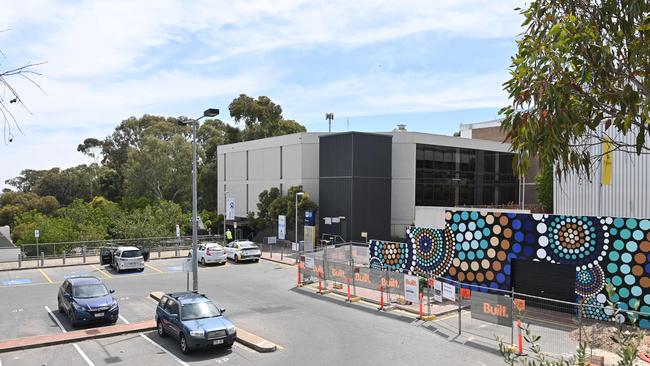
On Saturday, the state recorded two new infections with chief public health officer Nicola Spurrier confirming one of those was a student at the Flinders Intensive English Language Institute.
All students were told to quarantine after the school was linked to Adelaide’s Parafield cluster and the 30-year-old infected man was transferred to a medi-hotel.
Professor Spurrier said the Parafield cluster remained a concern and she was “a little disappointed” in the number of tests conducted on Friday, which was 3840.
“I’m sure some of the contribution to this was that it was very hot weather yesterday (so it) was difficult for people to get out,” she said.
“The testing rate was a bit low and I want to see it higher. I’d feel more reassured if we were testing more South Australians with respiratory symptoms.
“It is important that people — particularly those in the western suburbs — who have even the mildest symptoms get tested. It really is the key to our defence at this point in time for this Parafield cluster.”
READ MORE: The $1000 night before Christmas
Emily Ritchie 12.10pm: Sydney holds biggest indoor gig since March
Over 6000 feverish music fans have flocked – in a socially-distanced manner – to Sydney’s Qudos Bank Arena for the biggest indoor concert to be held in NSW since March.
The COVID-safe event, headlined by Northern Beaches psychedelic rockers Ocean Alley on Saturday night, marks a historic return to stadium-size shows in the state since the beginning of the coronavirus pandemic.

The show forms part of the larger Great Southern Nights series, which is bringing nearly 1000 gigs to the city and regional NSW across November.
The series was launched by the state government and promoters TEG Live and Live Nation in an attempt to kick-start recovery to the live music and hospitality industries which have been dramatically impacted by the pandemic.
The venue, which would typically host up to 21,000 people, was reduced to a capacity of just over 6000 to ensure NSW Health’s coronavirus social distancing measures could be adhered to.
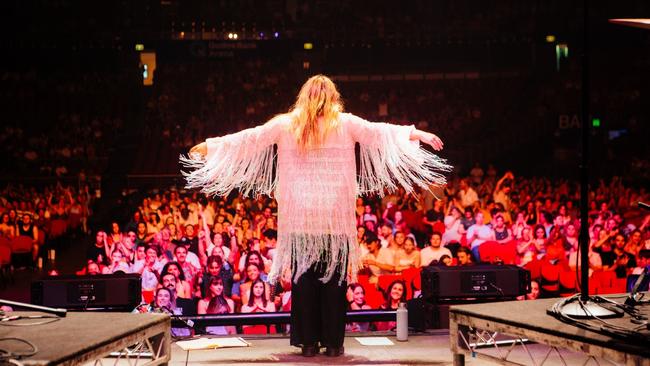
Masks were not mandatory at the gig but each group of people was separated by several chairs. Hand sanitising stations were scattered throughout the venue and mask-wearing ushers showed punters to their seats.
While revellers were unable to get up and dance, there was a palpable sense of energy in the crowd – with people bopping and singing along from their chairs.
While the temperature soared to almost 40 degrees outside as a severe heatwave gripped the state, the stadium was thankfully enclosed and well air-conditioned.
Support acts – Triple J darlings Ruby Fields and Jack River – expressed to the crowd their joy at returning to performing in front of large crowds.
“Im sure a lot of you haven’t seen any live music in months ans months, what a way for us all to reconnect,” Holly Rankin, who performs as Jack River, said.
Rankin also took aim at the state government, saying: “it’s so weird that we can’t dance. I was thinking we should classify these live music events as football games, then we could do whatever we want”.
Ruby Fields, 22, said it was “sick that we can do this again,” – adding that, while it had been a tough year, the pandemic had helped her make a lot of personal and artistic revelations that she was thankful for.
Ocean Alley said they were “absolutely stoked” to be back on the stage, having missed “every part of touring” this year.
“Last year we spent every other day in a new city, so it’s exciting to see live music making a comeback in NSW,” the band said.
“The opportunity to headline Qudos Bank Arena in our hometown makes this show that extra bit more special for us.”
Another 6000-strong crowd will attend the Qudos Bank next Saturday for another Great Southern Nights gig, headlined by former Powderfinger front man Bernard Fanning and Matt Corby.
READ MORE: Sydney endures hottest night in 53 years
Nic Savage 11.50am: Big Bash star tests positive to Covid
Hobart Hurricanes spin bowler Sandeep Lamichhane has tested positive for COVID-19 less than two weeks out from the Big Bash League.
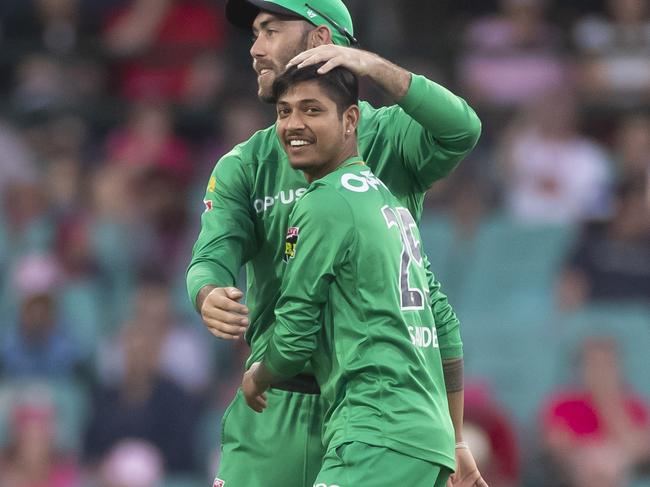
Having signed with the Hurricanes last week, Lamichhane revealed he had tested positive for the virus after experiencing “body aches”.
“It’s my sincere duty to tell you all that I have been tested positive for COVID-19,” Lamichhane tweeted on Saturday morning. “I had some body aches since Wednesday. But my health is improving a little bit now. If all goes well, I will return to the field again. Keep me in your prayers.”
The 20-year-old Nepalese cricketer was due to arrive in Australia for his mandatory two-week quarantine in mid-December.
It is now uncertain whether Lamichhane will be available for Hobart’s game against the Brisbane Heat at the Gabba on Sunday, December 27th.
— NCA Newswire
Greg Brown 11.10am: Relief as HomeBuilder extended for three months
The property industry has hailed the Morrison government’s decision to extend the HomeBuilder grant until the end of March.
Property Council of Australia chief executive Ken Morrison said the extension would support “tens of thousands more jobs while Australia prepares for a COVID safe restart to immigration and population growth”.
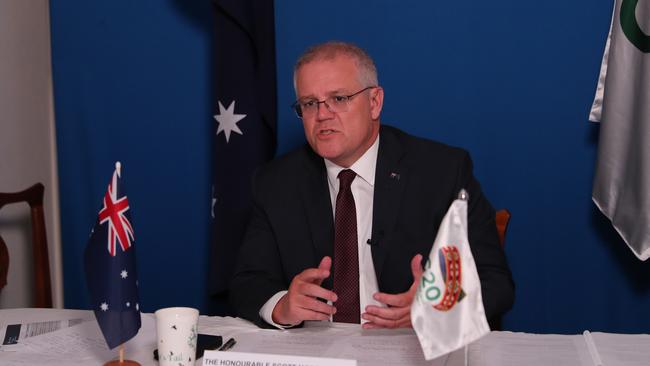
“HomeBuilder saved the construction industry from falling off a cliff earlier this year. But with no substantial immigration likely next year, it makes sense to extend this economic bridge further,” Mr Morrison said.
“This is a big win for hi-vis construction jobs across Australia and all the white collar jobs that support the sector.”
Scott Morrison on Saturday morning announced the program would be extended by three months, supporting the construction or renovation of an extra 15,000 homes.
The value of the grant for people undertaking new builds or renovations will decrease from $25,000 to $15,000. But price caps for new builds will be increased from $750,0000 to $950,000 in NSW and $850,000 in Victoria.
The Prime Minister said it would help “protect the jobs of one million Australians employed in the construction sector”.
“HomeBuilder is a key part of my government’s economic recovery plan for Australia. We’re keeping people in jobs and putting Australians’ dream homes within reach,” Mr Morrison said.
“It’s critical we keep the momentum up for Australia’s economic recovery.
“Extending HomeBuilder will mean a steady pipeline of construction activity to keep tradies on the tools.”
READ the full story
Anne Barrowclough 10.45am: Victoria now 30 days with no new cases
Victoria has now gone 30 days with no new cases and no deaths. After 5,905 test results there are also no active cases.
No new cases, lost lives or active cases reported yesterday. 5,905 results were received. More detail: https://t.co/eTputEZdhs
— VicGovDHHS (@VicGovDHHS) November 28, 2020
Remember, #EveryTestHelps – got symptoms? Get tested. #StaySafeStayOpen #COVID19Vic pic.twitter.com/0vE0bkg5n2
Staff writers 8.20am: Geelong residents tested after virus found in waste water
The Victorian government is calling for Geelong residents to get tested after traces of the coronavirus were found in wastewater in the city’s north this week.
Residents and visitors to Geelong’s northern suburbs and Lara from November 21 to 23 have been urged to get tested regardless of symptoms.
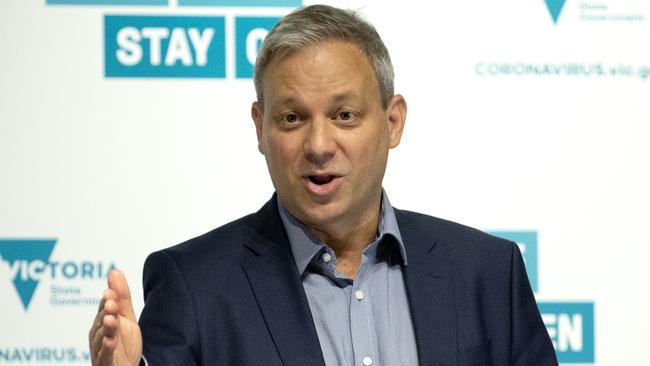
Across the state, a total of 3,563,335 tests have been processed in Victoria since the pandemic hit.
Victoria’s chief health officer Brett Sutton said obtaining test results from these areas is vital to surveillance of Victoria’s COVID-19 situation.
“The more people who present for testing, the more confident we can be in our current virus-free status,” he said.
The push comes as Queensland prepares to open its border to Victorians and NSW on Tuesday.
Tasmania opened its border to Victoria last week and the Northern Territory will open to Melburnians on Monday.
READ MORE: Sickly stench of government control
Staff writers 8.35am: Strict new measures in place for cruise ships
All cruise ship passengers and crew will have to return a negative COVID-19 test before they can board, in new safety measures being put in place by the industry.
The tough new protocols will include daily temperature checks, a ban on self-service buffets and mandatory masks as well as social distancing and regular on-board testing, the Sunday Telegraph reports.
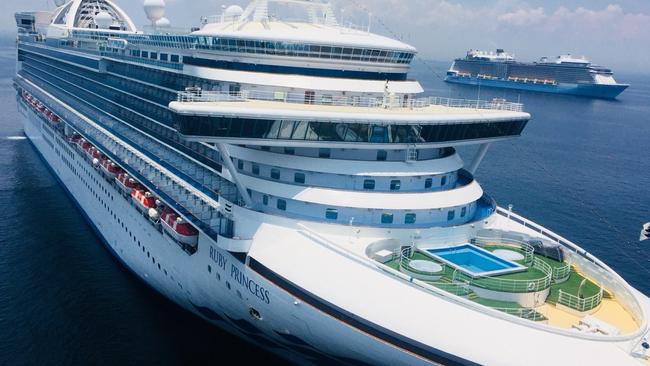
The Cruise Lines International Association (CLIA) Australasia is putting the measures in place in the hope the ban on cruising will be lifted by Christmas.
The ban, which came in to place on March 18 in the wake of the Ruby Princess debacle is set to expire on December 17.
Under the Biosecurity Determination, only ships with fewer than 100 passengers are permitted to enter Australian waters.
The Cruise Lines International Association (CLIA) Australasia has been working with the government on a phased resumption of domestic cruising in Australia, with a potential travel bubble with New Zealand and the South Pacific towards the middle of next year.
Anyone who has been recently subject to any COVID-19 exposure restrictions or who has recently arrived in Australia will be banned from boarding.
Other measures mirror those in place at licensed venues and retail outlets such as the 4sq m per person capacities, sanitation stations, enhanced cleaning and directional markings in high foot traffic areas.
READ MORE: Your slip-ups are showing, Premier
Agencies 7.35am: UK to approve vaccine next week
Britain is reportedly set to approve the COVID-19 vaccine developed by BioNTech SE and Pfizer next week, with deliveries starting within hours of the authorisation.
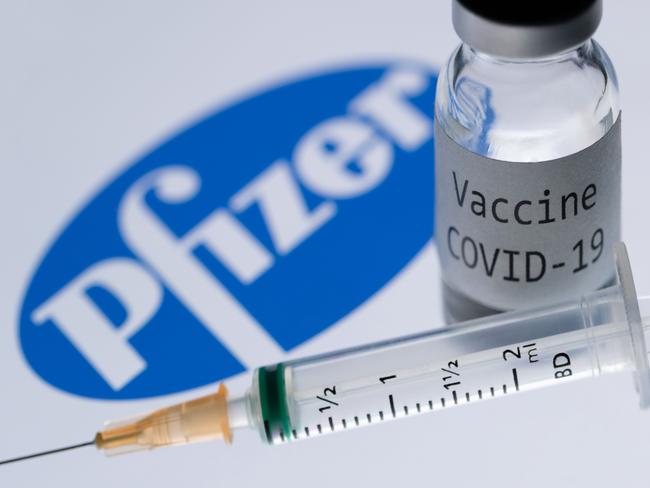
The first immunisations using the vaccine, which has been found to be 95 per cent effective, could take place as early as December 7, the Financial Times reports.
Last week the UK said it had formally asked its medical regulator, the Medicines and Healthcare Products Regulatory Agency (MHRA), to assess the Pfizer-BioNTech COVID-19 vaccine for its suitability, the first step in making it available outside the United States.
The UK government has ordered 40 million doses of the vaccine and has also asked the regulator to assess AstraZeneca’s COVID-19 vaccine for a possible rollout.
It has secured 100 million doses of that vaccine and has targeted a rollout to begin before Christmas.
READ MORE: LNP retains Groom
Jacquelin Magnay 7.00am: Protests over restrictions erupts across Europe
Protests erupted across European cities on Saturday, with thousands on the streets calling for civil liberty protections in London, anti-security measures in Paris and coronavirus restrictions on the German-Polish border.
Public patience for orders to adhere to the latest coronavirus lockdowns appears to be dissipating, even though many European nations announced last week a loosening of the rules for Christmas.
In London, more than 60 people were arrested in angry clashes with baton-wielding police who used tear gas to try and disperse a largely non-mask wearing crowd calling for an end to lockdown measures. Protesters yelled at police “shame on you’’ amid claims of a “fascist-state’’.
The anti-lockdown protest, organised by a group which advocates “no lockdowns, save lives, protest for freedom’’ and headed by Piers Corbyn – the brother of former Labour leader Jeremy Corbyn – started at Kings Cross before moving to Marble Arch and down Oxford Street to the West End.
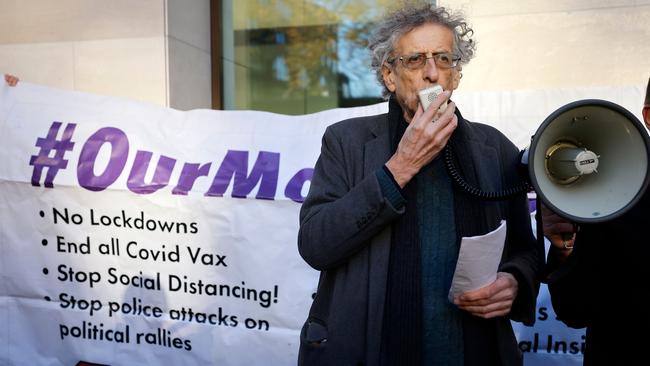
Swarms of police were filmed isolating various people in the street, knocking them to the ground and surrounding each person with up to a dozen officers. They had also blocked off key tube stations preventing others from joining the protest.
The Metropolitan Police had warned protesters they faced arrest under the current health regulations, claiming that any form of protest was illegal.
Yet this on-the-street fury is being matched inside the heart of government, with up to 100 backbench Tory MPs planning to rebel against Boris Johnson’s new tier regime that comes into place this week.
The British public is dismayed they won’t be able to mix with other households indoors until Easter, amid claims the tiers are not sophisticated and don’t represent local conditions. Anti-government tensions are rising as the continuing lockdown tier rules are seen as being harmful and disproportionate.
Senior Minister Michael Gove insisted on Saturday that hospitals throughout England would be overwhelmed with coronavirus cases if the tiers weren’t adhered to. But his warning is disputed because of the government’s previous poor handling of the coronavirus, including presenting dodgy data to justify the current month long lockdown.
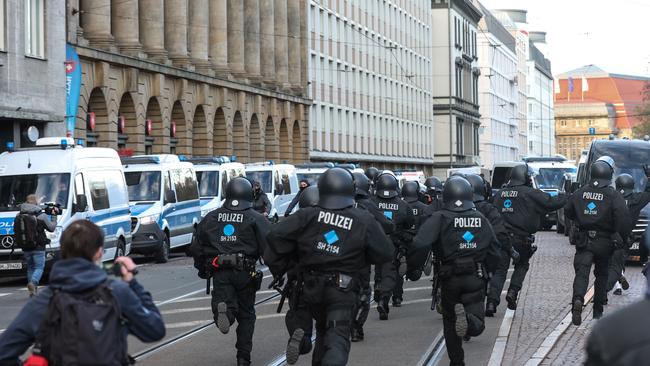
People classified as vulnerable are being given free doses of vitamin D to counter their isolation and lack of sunlight over the next few months. On Saturday Prime Minister Johnson also tried to placate some of the anger by allowing carol singers, in socially distant groups of six, to perform outside houses in the lead up to Christmas.
MP’s are upset that just three isolated regions are in the lowest tier of restrictions despite falling coronavirus cases across the land. The government announced on Saturday 479 people died within 28 days of testing positive for COVID-19 and there were nearly 16,000 new infections.
Government scepticism also manifested itself across the Atlantic in various protests throughout France including in Lille, Rennes and Strasbourg.
Tens of thousands attended a large protest, entitled “marches des liberties’’ in central Paris calling for a free press and repeal of a new French security law, called article 24, which bans the publication of pictures of police officers.
The release of a violent video showing French police following and then beating up black music producer Michel Zecler last week has fuelled mass anger at the law, which has yet to pass the senate, but which would curb the right of journalists to report on police brutality. President Emmanuel Macron said he was shocked at the video and said the police had ‘’shamed us’’.
The Paris protests, organised by journalist unions, civil liberty groups, environmental groups and yellow vests protesters, carried signs saying “Who will protect us from the police”, “Stop police violence” and “Democracy bludgeoned”. But the protests then turned violent as extreme antifa activists smashed cars and shops and threw fireworks at police.
“This bill aims to undermine the freedom of the press, the freedom to inform and be informed, the freedom of expression,” protest organisers said.
Meanwhile hundreds of people attended both anti-lockdown protests and a pro-mask counter demonstration on the German-Polish border in Frankfurt on Saturday.
READ MORE: Home grants scheme extended
Emily Ritchie 6.30am: SA records two new cases
South Australia recorded two new COVID-19 cases on Saturday, both linked to the Parafield cluster — which has now grown to 33 cases.
The two new cases are a child linked to the family at the centre of the cluster and a man in his thirties — a “casual contact” of a previous case.
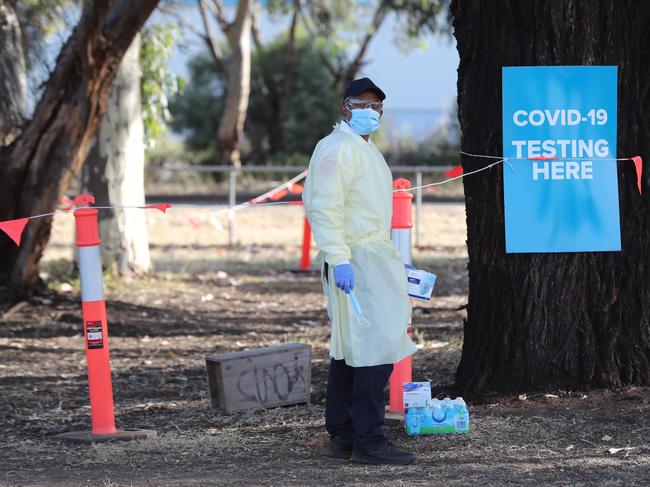
SA’s Chief Public Health Officer Nicola Spurrier said both cases were in quarantine and posed no further risk to the wider community.
Professor Spurrier said the child had originally tested negative but subsequently returned a positive result.
The total number of cases associated with the cluster is now 33, with 19 cases remaining active across the state.
About 5800 close contacts, or contacts of close contacts, have been identified to date in the wake of the cluster.
READ the full story
Paul Garvey 6.15am: West not wild about open borders
Western Australia’s border with Victoria — for air, land and sea transport — will remain closed for at least a few more days and the state is almost certain to be shut to South Australians this Christmas after Premier Mark McGowan turned his back on advice from his Chief Health Officer.
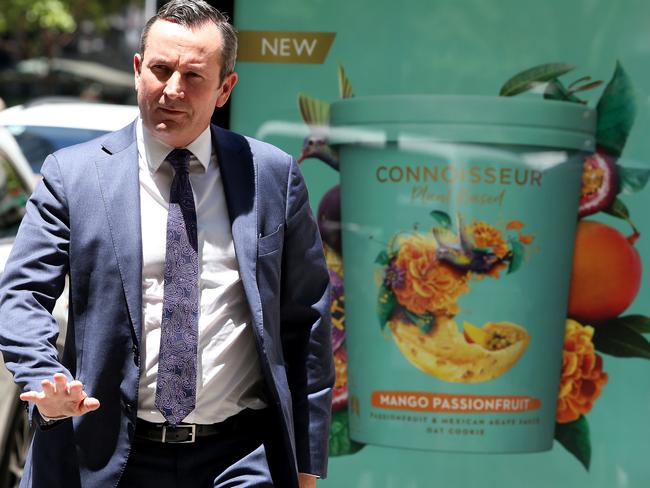
Victoria on Friday celebrated 28 days without any community transmission of the coronavirus, achieving elimination and reaching the threshold previously set by WA’s Chief Health Officer Andrew Robertson for the removal of quarantine requirements for arrivals from that state.
Dr Robertson last month said it would be safe to drop the need for two weeks of quarantine for arrivals from Victoria and NSW once those states achieved 28 days without the virus.
But Mr McGowan said Victorians would need to continue to wait until at least next week before they could enter WA, disappointing families who had hoped to reunite this weekend.
READ the full story




To join the conversation, please log in. Don't have an account? Register
Join the conversation, you are commenting as Logout